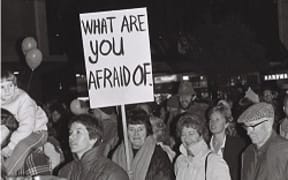Britain is to pardon thousands of gay and bisexual men who were convicted of crimes under sexual offence laws that have since been abolished.
Legislation enabling the pardon has been dubbed 'Turing's law' after Alan Turing - the Second World War codebreaker whose work inspired the film 'The Imitation Game'.
He was convicted of gross indecency with a 19-year-old man in 1952 and posthumously pardoned in 2013.
Homosexual acts were not decriminalised in England until 1967 and it was not until 2001 that the age of consent for homosexuals was reduced to 16, bringing it into line with the law governing heterosexuals.
George Montague, who was convicted in 1974 of gross indecency, said a formal apology would be better than a pardon.
"Why are we getting pardons, you only give pardons to people who were guilty, what were we guilty of? Nothing, we did nothing. Heterosexual people could do what they liked, in shop doorways, in the backs of cars, in the woods, anywhere, It didn't apply to them."
Lord John Sharkey, who has been pushing the government to issue pardons, said 65,000 men were convicted under the now-repealed laws, and 15,000 of them were still alive.

March in support of New Zealand's Homosexual Law reform Bill, 1986. Photo: David Hindley
In New Zealand, the government is considering something similar but it is more likely to be on a case by case basis.
In July this year Green MP Kevin Hague presented a petition to Parliament calling for an official apology to the men who were convicted before 1986 for having sex with other men.
Hundreds of men were convicted before New Zealand passed the Homosexual Law Reform Bill 30 years ago, which removed criminal penalties.
Mr Hague wants the convictions overturned and said it was time the government put things right.
Justice Minister Amy Adams said the government would consider it but would probably address each case as it stood, rather than wiping all convictions at once.
She said some of the sentences would still stand today.
"The way the law was crafted it didn't distinguish between consensual and non-consensual acts. A lot of the offences are still offences under today's law, around under-age children and the like.
"In fact my advice is that at least 80 percent of them would still be offences under today's law."
The Justice and Electoral Committee recently sought public submissions on the petition presented to Parliament.
-ABC/Reuters/RNZ





